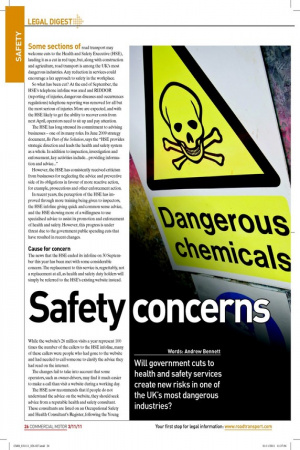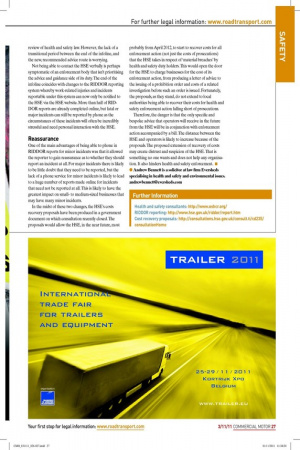Safety concerns Words: Andrew Bennett
Page 20

Page 21

If you've noticed an error in this article please click here to report it so we can fix it.
Will government cuts to health and safety services create new risks in one of the UK’s most dangerous industries?
Some sections of road transport may welcome cuts to the Health and Safety Executive (HSE), lauding it as a cut in red tape, but, along with construction and agriculture, road transport is among the UK’s most dangerous industries. Any reduction in services could encourage a lax approach to safety in the workplace.
So what has been cut? At the end of September, the HSE’s telephone infoline was axed and RIDDOR (reporting of injuries, dangerous diseases and occurrences regulations) telephone reporting was removed for all but the most serious of injuries. More are expected, and with the HSE likely to get the ability to recover costs from next April, operators need to sit up and pay attention.
The HSE has long stressed its commitment to advising businesses – one of its many roles. Its June 2009 strategy document, Be Part of the Solution, says the “HSE provides strategic direction and leads the health and safety system as a whole. In addition to inspection, investigation and enforcement, key activities include... providing information and advice...”
However, the HSE has consistently received criticism from businesses for neglecting the advice and preventive side of its obligations in favour of more reactive action, for example, prosecutions and other enforcement action.
In recent years, the perception of the HSE has improved through more training being given to inspectors, the HSE infoline giving quick and common sense advice, and the HSE showing more of a willingness to use specialised advice to assist its promotion and enforcement of health and safety. However, this progress is under threat due to the government public spending cuts that have resulted in recent changes.
Cause for concern
The news that the HSE ended its infoline on 30 September this year has been met with some considerable concern. The replacement to this service is, regrettably, not a replacement at all, as health and safety duty holders will simply be referred to the HSE’s existing website instead.
While the website’s 26 million visits a year represent 100 times the number of the callers to the HSE infoline, many of these callers were people who had gone to the website and had needed to call someone to clarify the advice they had read on the internet.
The changes fail to take into account that some operators, such as owner-drivers, may ind it much easier to make a call than visit a website during a working day.
The HSE now recommends that if people do not understand the advice on the website, they should seek advice from a reputable health and safety consultant. These consultants are listed on an Occupational Safety and Health Consultant’s Register, following the Young review of health and safety law. However, the lack of a transitional period between the end of the infoline, and the new, recommended advice route is worrying.
Not being able to contact the HSE verbally is perhaps symptomatic of an enforcement body that isn’t prioritising the advice and guidance side of its duty. The end of the infoline coincides with changes to the RIDDOR reporting system whereby work-related injuries and incidents reportable under this system can now only be notiied to the HSE via the HSE website. More than half of RIDDOR reports are already completed online, but fatal or major incidents can still be reported by phone as the circumstances of these incidents will often be incredibly stressful and need personal interaction with the HSE.
Reassurance
One of the main advantages of being able to phone in RIDDOR reports for minor incidents was that it allowed the reporter to gain reassurance as to whether they should report an incident at all. For major incidents there is likely to be little doubt that they need to be reported, but the lack of a phone service for minor incidents is likely to lead to a huge number of reports made online for incidents that need not be reported at all. This is likely to have the greatest impact on smallto medium-sized businesses that may have many minor incidents.
In the midst of these two changes, the HSE’s costs recovery proposals have been produced in a government document on which consultation recently closed. The proposals would allow the HSE, in the near future, most probably from April 2012, to start to recover costs for all enforcement action (not just the costs of prosecutions) that the HSE takes in respect of ‘material breaches’ by health and safety duty holders. This would open the door for the HSE to charge businesses for the cost of its enforcement action, from producing a letter of advice to the issuing of a prohibition order and costs of a related investigation before such an order is issued. Fortunately, the proposals, as they stand, do not extend to local authorities being able to recover their costs for health and safety enforcement action falling short of prosecutions.
Therefore, the danger is that the only speciic and bespoke advice that operators will receive in the future from the HSE will be in conjunction with enforcement action accompanied by a bill. The distance between the HSE and operators is likely to increase because of the proposals. The proposed extension of recovery of costs may create distrust and suspicion of the HSE. That is something no one wants and does not help any organisation. It also hinders health and safety enforcement. n ● Andrew Bennett is a solicitor at law irm Eversheds specialising in health and safety and environmental issues. andrewbennett@eversheds.com
Further Information
Health and safety consultants: http://www.oshcr.org/ RIDDOR reporting: http://www.hse.gov.uk/riddor/report.htm Cost recovery proposals: http://consultations.hse.gov.uk/consult.ti/cd235/ consultationHome













































